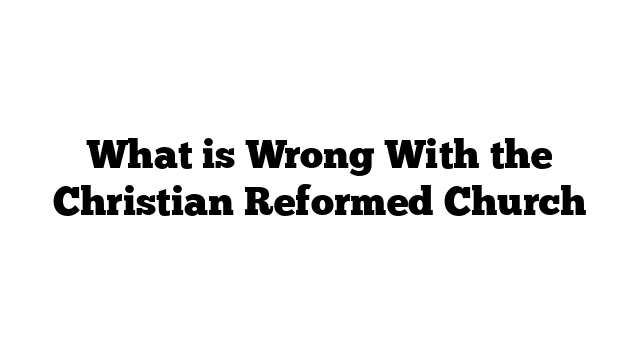Miscellaneous
What is Wrong With the Christian Reformed Church
Title: Understanding the Christian Reformed Church: A Closer Look at Its Teachings and Practices
Introduction
The Christian Reformed Church (CRC) is a Protestant denomination that holds to Reformed theology. While it has been criticized in various forums, it is important to examine the reasons, beliefs, and practices of the CRC in order to gain a fuller understanding of what the church stands for. In this article, we will look at the key aspects of the denomination, including its history, theological beliefs, worship practices, and community involvement.
History of the Christian Reformed Church
The Christian Reformed Church traces its roots back to the Protestant Reformation in the 16th century. The Reformation, led by key figures such as Martin Luther and John Calvin, sought to reform certain practices and teachings within the Roman Catholic Church. The Reformation gave rise to various Protestant denominations, including the Dutch Reformed Church, from which the Christian Reformed Church emerged.
The CRC was officially founded in 1857 and primarily consists of Dutch immigrants and their descendants in North America. Initially, the church focused on preserving Dutch traditions and language. However, over time, the CRC has become more diverse and inclusive, embracing individuals from different cultural backgrounds.
Theological Beliefs of the Christian Reformed Church
The Christian Reformed Church is known for its unwavering commitment to Reformed theology. At the core of its beliefs is the doctrine of salvation by grace through faith. The CRC emphasizes the sovereignty of God, the fallen nature of humanity, and the need for redemption.
One of the key theological doctrines of the CRC is the concept of “covenant.” The church views God’s relationship with His people as one of covenant, a binding agreement where God promises to be faithful and His people are called to live in obedience. This understanding of covenant influences the church’s approach to baptism, which is seen as a sign and seal of God’s covenant relationship with His people.
Worship Practices in the Christian Reformed Church
The worship practices of the CRC reflect its Reformed heritage. The liturgy typically includes elements such as Scripture readings, prayers, hymns, and sermons. The preaching of the Word is highly valued in CRC worship services, as it is seen as a means through which God speaks to His people.
Another important aspect of CRC worship is the celebration of the sacraments. The CRC recognizes two sacraments: baptism and the Lord’s Supper (also known as communion). Baptism is administered to both adults and infants as a visible sign of inclusion in the covenant community. The Lord’s Supper is celebrated as a remembrance of Christ’s sacrifice and an opportunity for believers to commune with Him.
Involvement in the Community
The Christian Reformed Church places a strong emphasis on community involvement and social justice. The CRC believes that the Gospel should not just be preached, but also lived out in practical ways. As a result, many CRC congregations are actively engaged in service projects, both locally and globally.
From food drives and homeless shelters to international mission trips and disaster relief efforts, the CRC seeks to address the needs of the marginalized and the vulnerable. Additionally, the church is involved in advocating for justice and equality, promoting the sanctity of life, and caring for God’s creation.
Conclusion
While the Christian Reformed Church has faced criticisms and differences of opinion, it is important to approach any evaluation with a fair and comprehensive understanding of the denomination. The CRC’s commitment to Reformed theology, its rich liturgical tradition, and its engagement in community service reflect its desire to live out its faith in a meaningful and impactful way.
By exploring the history, theological beliefs, worship practices, and community involvement of the CRC, we can gain a deeper appreciation for the denomination and the positive contributions it makes within the broader Christian community.

